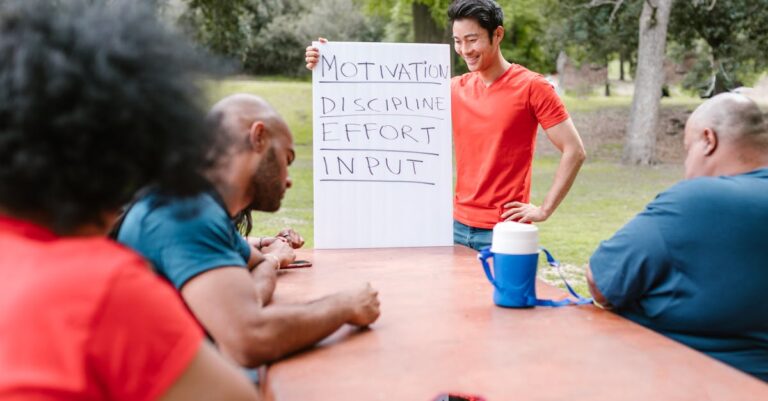Table of Contents
ToggleNavigating the wild world of relationships can feel like trying to solve a Rubik’s Cube blindfolded. Everyone’s got an opinion, and the advice can range from the profound to the downright perplexing. You might find yourself wondering if the secret to a happy partnership lies in deep conversations or simply in agreeing on what to binge-watch next.
Understanding Common Relationship Advice
Every relationship benefits from applying practical advice. Below are key elements that enhance connections between partners.
The Importance of Communication
Effective communication fosters understanding and connection. Engaging in open discussions helps partners express needs and desires. Misunderstandings often arise from unspoken thoughts. Listening actively makes a significant difference in relationship dynamics. Sharing feelings strengthens bonds, making it easier to resolve conflicts. Ensuring both partners feel heard and valued creates a safe environment for dialogue. Conversations about everyday topics can also deepen intimacy. Practicing honest communication leads to greater commitment and satisfaction.
Trust and Vulnerability
Trust serves as the foundation of any strong relationship. Being vulnerable with a partner encourages deeper connections. Sharing personal experiences builds empathy and understanding. Establishing trust takes time but is crucial for a healthy partnership. Knowing that both partners can remain open without judgment fosters a sense of security. When both individuals feel safe, they are more willing to explore emotions together. Regularly affirming each other’s strengths and intentions enhances trust. Fostering vulnerability creates a richer, more meaningful partnership over time.
Types of Common Relationship Advice
Different types of relationship advice exist to help partners navigate challenges effectively and deepen their connections. Engaging with these approaches enhances understanding and strengthens bonds.
Conflict Resolution Strategies
Effective conflict resolution strategies can prevent misunderstandings from escalating. Addressing disagreements immediately fosters a collaborative atmosphere. Partner discussions should focus on feelings rather than accusations, as this encourages openness. Prioritizing solutions over blame paves the way for constructive dialogues. Practicing active listening allows partners to feel heard and validated. Utilizing ‘I’ statements, like “I feel neglected when…” clarifies emotions without triggering defensiveness. Seeking compromise helps partners meet each other halfway and build mutual respect.
Building Emotional Connection
Building emotional connection significantly enhances relationship satisfaction. Sharing personal experiences fosters vulnerability between partners. Engaging in regular, meaningful conversations allows for deeper insights into each other’s lives. Activities like date nights or shared hobbies cultivate shared memories and strengthen bonds. Expressing appreciation through small gestures reinforces commitment. Practicing empathy helps partners understand each other’s perspectives better. Prioritizing time for each other creates space for intimacy and emotional safety, enhancing relationship dynamics overall.
When to Seek Professional Help
Recognizing when a relationship requires external support is essential for maintaining a healthy partnership. Seeking professional help can be beneficial for couples who encounter persistent issues.
Recognizing Relationship Patterns
Identifying recurring problems is crucial for understanding relationship dynamics. Couples often overlook patterns of communication, conflict, or emotional distance. Recognizing these signs enables introspection and change. Frequent arguments without resolution might indicate deeper issues. Patterns in trust erosion or emotional neglect also warrant attention. Noticing these elements can indicate the need for professional intervention. Taking proactive steps in addressing concerns often leads to improved outcomes.
Benefits of Counseling
Counseling offers numerous advantages for couples navigating challenging dynamics. Professional guidance can provide new perspectives and tools for effective communication. Structured sessions allow partners to express feelings in a safe environment. Therapists can facilitate discussions that help resolve conflicts constructively. Couples may learn techniques for managing stress and enhancing emotional support. Engaging with a counselor can also strengthen trust and empathy between partners. Lasting change often occurs when couples commit to the counseling process.
Do’s and Don’ts of Relationship Advice
Understanding effective practices can enhance partnership dynamics. Recognizing what helps and what harms strengthens bonds.
Positive Reinforcement
Affirming your partner fosters mutual appreciation. Compliments and acts of kindness build a supportive environment. Expressing gratitude for small gestures reinforces positive behaviors. Verbal praises create motivation to maintain efforts in the relationship. Celebrating achievements, whether big or small, nurtures a sense of teamwork. It’s essential to recognize when your partner does something well and express that acknowledgment promptly. Consistent positive reinforcement cultivates a deep emotional connection and enhances relationship satisfaction.
Avoiding Toxic Behaviors
Recognizing toxic behaviors promotes healthier interactions. Gaslighting undermines trust and should be avoided entirely. Criticism often escalates conflicts, making constructive communication essential. Dismissing feelings also creates emotional distance; acknowledging them is key to maintaining connection. Stonewalling, or withdrawing from discussions, stalls progress and exacerbates tensions. Boundaries set against manipulative and controlling actions protect individual well-being. Encouraging open dialogue about feelings helps partners avoid toxic patterns and promotes a positive relationship atmosphere.
Navigating the complexities of relationships requires a blend of effective communication and emotional connection. Partners can strengthen their bond by prioritizing open discussions and actively listening to each other’s needs. Building trust and vulnerability lays the groundwork for deeper intimacy, while conflict resolution strategies help maintain harmony during disagreements.
It’s essential to recognize when external support may be beneficial, as professional guidance can offer fresh insights and tools for improvement. By fostering a positive environment through affirmations and shared experiences, couples can nurture their relationship and enhance satisfaction. Ultimately, a commitment to understanding and growth is key to thriving partnerships.





